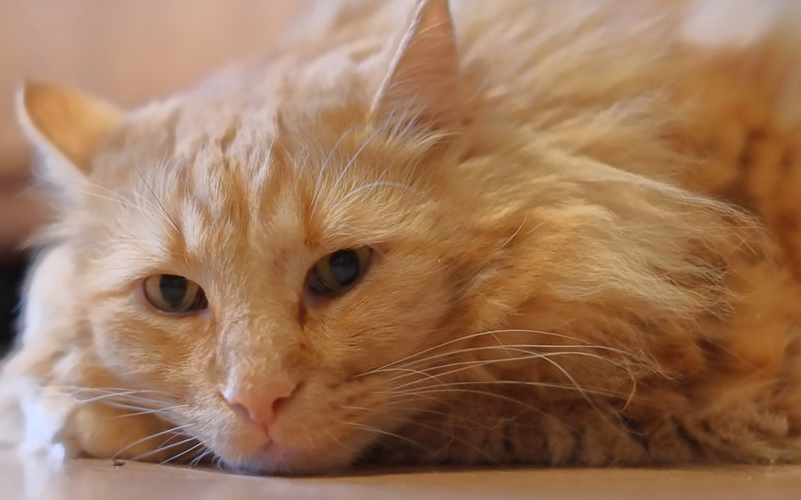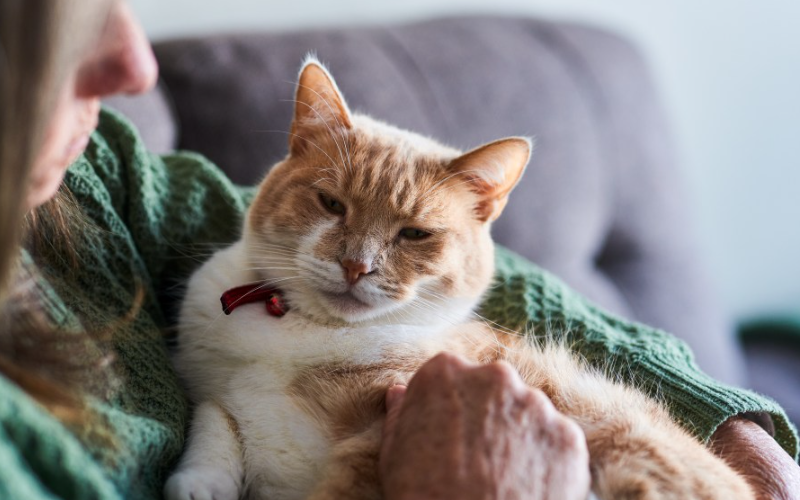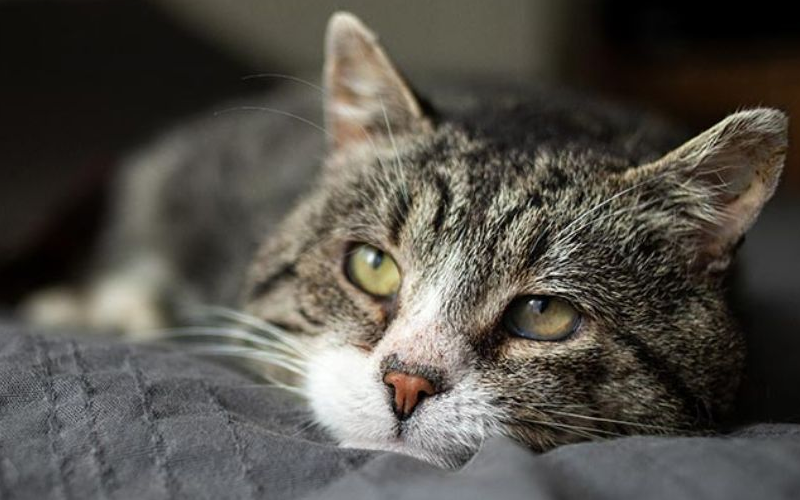
Many senior cats live long, happy lives, yet changes in behavior can feel worrying. Studies show that more than 55% of cats over 11 develop signs of senior cat dementia. These changes can confuse both cats and their families.
Senior cat dementia, also called feline cognitive dysfunction, affects memory and daily habits. A cat may forget routines, seem restless at night, or get lost in familiar spaces. These signs often look like simple aging, but they point to something more.
Early recognition makes a big difference in your cat’s quality of life. You can help slow the decline with the right care and support. This vet-approved guide explains: ‘How do you know if your senior cat has dementia?’ and what steps to take.
What is dementia in senior cats?
Dementia in senior cats is called feline cognitive dysfunction (FCD). It affects the brain and changes how a cat thinks, learns, and remembers. Over time, this decline makes simple daily tasks harder for your cat.
Normal aging causes slower movements and less play, but dementia goes further. A healthy older cat still knows its family and routine. A cat with dementia may seem lost, forget where the litter box is, or cry at night.
Dementia is not rare, it is a common issue many families face. Recognizing the difference between aging and dementia is the first step to helping your cat.
Key differences between aging and dementia in cats:
- Aging: Slight decrease in energy, longer naps, mild stiffness.
- Dementia: Confusion, memory loss, disrupted sleep, personality shifts.
How do you know if your senior cat has dementia?
Cats with dementia often show changes in routine, memory, and behavior. These signs may appear slowly, so it helps to know what to watch for. Spotting them early gives your cat the best chance for comfort.
1. Changes in daily routine and confusion
A cat may wander or get stuck in corners. It might forget the location of its food bowl or litter box. Familiar rooms can suddenly feel strange to a cat with dementia.
2. Disrupted sleep and restlessness
Many cats with dementia pace or cry during the night. They may wake you often or seem anxious in the dark. This restless behavior disrupts the whole household.
3. Memory loss and disorientation
Cats may forget family members or stare at walls for long periods. Some stand still as if unsure of their next step. Others appear lost, even in a small home.
4. Personality and behavior shifts
Your once-friendly cat may grow irritable or distant. Some cats cling to their owners more than before. Others stop seeking affection or ignore toys completely.
5. Litter box accidents and hygiene decline
A senior cat with dementia may forget litter box training. It may urinate or defecate in random spots. Grooming habits often decline, leaving fur greasy or matted.
At what age do cats get dementia?
Most cats start showing signs of dementia around 11 to 14 years old. The risk grows higher as cats reach their late teens. By 15, more than half of cats may show at least one symptom.
Aging changes the brain, just like it changes joints and organs. Brain cells slow down, and memory pathways weaken. These changes explain why dementia becomes more common in very old cats.
Not every senior cat will develop dementia. Some cats stay sharp into their 20s with no signs at all. Still, knowing the average age helps families stay alert to early warnings.
See more: Cat grooming secrets: How to clean your older cat’s matted fur
What causes senior cat dementia?
Senior cat dementia develops as brain cells break down over time. This decline affects memory, learning, and behavior. The exact cause is complex, but several factors play a role.
One factor is reduced blood flow to the brain. This limits oxygen and nutrients, making brain function weaker. Another factor is the buildup of proteins that damage brain cells.
Other health issues can also contribute:
- Arthritis pain may add stress that worsens confusion.
- Kidney disease can affect toxin levels in the blood.
- Hyperthyroidism may speed up brain aging.
- Genetics may make some cats more at risk than others.
Not every cat with these problems develops dementia. Still, these factors raise the chance that changes will appear as your cat ages.

How does a vet diagnose dementia in senior cats?
Vets use a mix of exams, history, and tests to diagnose dementia. They look for patterns in behavior that match cognitive decline. The process rules out other health issues that mimic the same signs.
A vet usually starts with a full physical exam and blood work. These tests check for kidney disease, thyroid problems, or diabetes. Each of these conditions can cause confusion or behavior changes.
Neurological exams may also be done to check reflexes and brain function. Some vets use cognitive assessment tools designed for cats. Videos or notes from home often give important clues about daily behavior.
The diagnosis is based on both medical results and observed changes. Clear communication between you and the vet helps make the diagnosis more accurate.
What should you do if your senior cat shows dementia signs?
You play a key role in helping your cat get the right care. Small steps at home make a big difference. The first move is to involve your vet.
Schedule a vet checkup right away
A vet can confirm if the changes come from dementia or another illness. Early care slows decline and improves comfort. Never wait to see if things “fix themselves.”
Keep a diary of symptoms
Write down changes in sleep, eating, and litter box use. Note the times and frequency of odd behavior. This record helps the vet see patterns over time.
Share videos or notes with your vet
Bring short clips or written notes to your appointment. Many signs appear at home and not in the clinic. Your records give the vet a clearer picture.
Can senior cat dementia be treated or managed?
Senior cat dementia cannot be cured, but it can be managed. The right care slows decline and improves quality of life. A mix of medical help and home support works best.
Vet-prescribed medications and supplements
Some medicines improve brain function or reduce anxiety. Supplements with antioxidants or fatty acids may also help. Your vet decides what fits your cat’s health.
Supportive diet and nutrition
Special diets support brain health with omega-3s, vitamins, and antioxidants. Food rich in these nutrients may improve memory and awareness. Ask your vet about prescription diets for cognitive care.
Environmental changes at home
Keep your cat’s routine steady and predictable. Add night lights for cats that wander after dark. Place food, water, and litter boxes in easy-to-reach spots.
Mental stimulation and comfort
Offer puzzle feeders, gentle play, or safe exploring. Daily affection keeps your cat calm and connected. Mental engagement slows decline and brings comfort.
How long can a cat live with dementia?
Cats with dementia can often live for several years after diagnosis. Their lifespan depends on age, overall health, and how quickly symptoms progress. Quality of care also plays a huge role in how well they cope.
Studies show that more than 55% of cats over age 11 display at least one sign of cognitive decline, and by the time they reach 15 years or older, up to 80% are affected. Despite this, many cats continue to live comfortably into their late teens and even early 20s with the right support.
Some cats decline faster, especially if other chronic illnesses like kidney disease, arthritis, or hyperthyroidism are also present. This is why regular veterinary check-ups every 6–12 months are essential for tracking changes and adjusting care.
The focus should always be on quality of life, not just the length of life. A cat that feels safe, loved, and supported—through consistent routines, environmental enrichment, and proper medical care—can enjoy many good years despite dementia.
Source: ASPCA
When should you talk to your vet about euthanasia?
Deciding when to consider euthanasia is one of the hardest choices. Talk to your vet if your cat struggles to eat, move, or use the litter box. Persistent pain, severe confusion, or constant anxiety are also warning signs.
Keep track of your cat’s daily comfort and happiness. A vet can help assess the quality of life using simple scoring tools. Honest conversations prevent unnecessary suffering and guide compassionate decisions.
Emotional support matters for both you and your cat. Lean on friends, family, or support groups. Knowing when to act shows love and care for your senior companion.

FAQs:
1. What are the early signs of dementia in senior cats?
Early indicators include increased vocalization, disorientation, disrupted sleep-wake cycles, house soiling, and changes in activity levels. These symptoms are collectively known as VISHDAAL: Vocalization, Interaction alterations, Sleep-wake cycle changes, House soiling, Disorientation, Activity level changes, Anxiety, and Learning and memory issues.
2. Can feline dementia be prevented?
While there’s no guaranteed prevention, maintaining a consistent daily routine, providing mental stimulation through interactive toys, and ensuring a balanced diet rich in antioxidants and omega-3 fatty acids may help support cognitive health in senior cats.
3. Are certain cat breeds more prone to dementia?
There is no specific evidence suggesting that certain cat breeds are more susceptible to dementia. However, older cats, regardless of breed, are at a higher risk due to age-related changes in the brain.
4. How does feline dementia affect a cat’s behavior?
Cats with dementia may exhibit confusion, forgetfulness, disrupted sleep patterns, increased vocalization, and a decline in grooming habits. They might also become more anxious or withdrawn.
5. Is there a cure for feline dementia?
Currently, there is no cure for feline dementia. Treatment focuses on managing symptoms and improving quality of life through environmental enrichment, dietary adjustments, and, in some cases, medication.
6. Can feline dementia be misdiagnosed?
Yes, other medical conditions such as hyperthyroidism, kidney disease, or arthritis can cause symptoms similar to dementia. A thorough veterinary examination is essential to rule out these conditions before diagnosing dementia.
7. How does feline dementia compare to Alzheimer’s in humans?
Feline dementia shares similarities with Alzheimer’s disease in humans, including the buildup of amyloid plaques in the brain. However, the progression and symptoms can differ between species.
8. Can environmental changes help manage feline dementia?
Yes, creating a stable environment with consistent routines, familiar surroundings, and easy access to food, water, and litter boxes can help reduce confusion and anxiety in cats with dementia.
9. Are there any medications for feline dementia?
While not FDA-approved for cats, some veterinarians may prescribe medications like selegiline, an MAO-B inhibitor, to help manage symptoms of cognitive dysfunction in cats.
10. How can I support my senior cat’s cognitive health?
Providing a balanced diet, regular veterinary check-ups, mental stimulation through interactive play, and maintaining a consistent daily routine can support your senior cat’s cognitive health and overall well-being.
Final thoughts on senior cat dementia
Recognizing dementia early gives your cat the best chance at comfort. Watch for changes in behavior, sleep, and litter habits. Keeping records helps your vet provide the right care.
Supportive diets, mental stimulation, and consistent routines make a real difference. Medications or supplements may slow the decline and improve daily life. Small changes at home can bring calm and joy to your senior cat.
Trust your instincts and work closely with your vet. Many cats live happily for years with proper care. Love, patience, and attention help your companion feel safe and cherished every day.